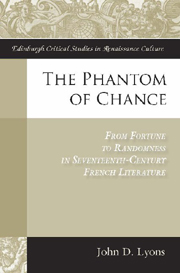Book contents
- Frontmatter
- Contents
- Preface: The Phantom of Chance
- Acknowledgements
- Series Editor's Preface
- Introduction
- 1 Fortune, Mistress of Events: Corneille and the Poetics of Tragedy
- 2 God in a World of Chance: Pascal's Pensées and Provincial Letters
- 3 From Chance Events to Implausible Actions: Lafayette and the Novel
- 4 The God of Suspense: Bossuet's Providential History and Racine's Athalie
- 5 An Accidental World: La Bruyère's Characters
- Conclusion
- Bibliography
- Index
4 - The God of Suspense: Bossuet's Providential History and Racine's Athalie
Published online by Cambridge University Press: 12 September 2012
- Frontmatter
- Contents
- Preface: The Phantom of Chance
- Acknowledgements
- Series Editor's Preface
- Introduction
- 1 Fortune, Mistress of Events: Corneille and the Poetics of Tragedy
- 2 God in a World of Chance: Pascal's Pensées and Provincial Letters
- 3 From Chance Events to Implausible Actions: Lafayette and the Novel
- 4 The God of Suspense: Bossuet's Providential History and Racine's Athalie
- 5 An Accidental World: La Bruyère's Characters
- Conclusion
- Bibliography
- Index
Summary
At the end of the seventeenth century, French literary, historical and political thought seemed to reach a triumphant unity. The nation's greatest tragic poet had become historiographer of the king and was charged with writing the story of the reign of Louis XIV. The most splendid royal residence in Europe, the château de Versailles, became the permanent home of the court in 1682. Three years later, Louis revoked the Édit de Nantes, thus forcing official religious uniformity in the country he ruled as absolute monarch. It was time for the century itself to be named for this moment of perfection in the poem ‘Le Siècle de Louis le Grand’. Two works from this period of grandeur are among the most official of its literary production: Jacques-Bénigne Bossuet's Discours sur l'histoire universelle (1681) and Jean Racine's last tragedy, Athalie (1691). Both of them seem to present the vision of a culture satisfied with its place in the world and possessed of an apparently unified aesthetic, theological and political vision. What room could there be in such works for the fortuitous? It seems, at the outset, that this is not the place to look for chance, but whenever there are great displays of system, chance cannot be far away.
- Type
- Chapter
- Information
- The Phantom of ChanceFrom Fortune to Randomness in Seventeenth-Century French Literature, pp. 135 - 173Publisher: Edinburgh University PressPrint publication year: 2011



